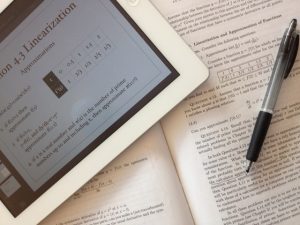to miss (verb)
to discover or feel the absence of

It was about a year ago that I drafted my resignation letter from Goshen College. I was resigning to homestead in the city, to explore small-scale farming, to apprentice at a local produce farm, to start on a different career and see where that would lead me.
Every so often, I get asked the question: “Do you miss it?” I honestly answer, “No,” but I always feel that I need to explain that answer. After all, I was a teacher. It is a profession that many would characterize as a vocation or a calling. We teachers are to be committed to our students, our colleagues, our discipline, the institutions at which we teach. It was hard not to feel a little bit of guilt for having left all that. I was supposed to be a role model and a mentor – a female Ph.D. mathematician in a field still dominated by men. So then, to say that I don’t miss it seems a bit harsh and I feel that I should somehow soften that statement.
I don’t like to use the word “miss.” By definition, “to miss” means “to feel the absence of.” For me, the word “miss” carries with it a sense of regret. If I feel the absence of something, I am looking back at what once was, perhaps dwelling on what could have been. I prefer looking ahead and at what could yet be. That does not mean that I don’t remember (and remember fondly) what was, but I don’t view the past as an absence in my life, as a hole to be filled.
In 1989, Pete and I moved from Evanston, Ill., to Seattle. As we were moving, we were reminded of the 1985 film “The Trip to Bountiful,” where an elderly woman longed to go back to what she still considered her “home” in Bountiful, Texas. She managed to get back there, only to find a deserted, desolate place. It seemed sad – she couldn’t embrace her new home because she was always longing for her old home. She was missing Bountiful, acutely feeling its absence, but Bountiful was no more. We liked living in Evanston, close to Lake Michigan and the parks and beaches, just a short “L” ride to downtown Chicago and the shopping, restaurants and people–watching of a big city. But we were moving to a new city and we didn’t want to keep looking back. So, to mark our new start, we named our Seattle apartment “Bountiful,” to remind us to consider our new location as our new true home, our own “Bountiful.”
When we moved from Seattle to Goshen, our friends in Seattle encouraged us to keep our house, to rent it out, but not sell it, so that we would have a place to come back to. But if we would have done that, would we have been holding on to the past and not looking forward to the future? If we kept our house on Vashon Island, would we ever truly embrace our new home in Goshen? After considering these questions, instead of hanging on to what was, we sold the house that we built and embraced our move as a new adventure. When we were asked why we ever left Seattle to come to Goshen, we replied that it was our Great Indiana Adventure.
In these transitions, even though I was leaving places and people I loved, I never wanted to use the word “miss.” Likewise, now, in my transition from teaching to homesteading and farming, I do not want to use the word “miss.” I enjoyed teaching mathematics. Sure, there were aspects of teaching that did not thrill me (I never looked forward to grading) but, overall, teaching was a profession I loved and was (I think) pretty good at it.
Two weeks ago I was back in the classroom, a substitute for two class periods in one of my favorite courses at Goshen College. It was great. I loved preparing for class, going over the material again, working out examples, solving those homework problems, answering questions, engaging with the students, having conversations with my former colleagues in Science Hall. I experienced again the joys of the academic life.
There were many joys. I have great memories of teaching. Right now, however, instead of dwelling on memories, I am looking forward, wondering where my new experiences will lead me – and building new memories.
Will I ever teach again? Maybe. I am not ruling it out. But do I miss it? No.
